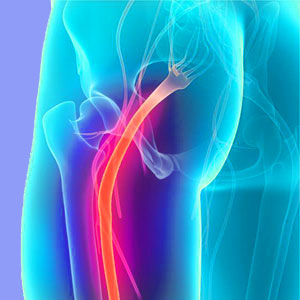
RSI sciatica may result from various types of repetitive strain and repetitive stress injuries to the spine and/or to the muscular tissues that surround the fully formed sciatic nerve. RSI is certainly a diagnosis on the rise and it can create acute, episodic or even chronic pain in select circumstances.
What is RSI? How did I get it? What can I do to find relief? These questions are usually the top 3 on most patients’ minds following a diagnosis. We would like to add one of our own… Is RSI real and is it the true cause of my sciatica pain? This one is at least as important, given the common misdiagnosis of RSI in recent years.
This discussion focuses on RSI and sciatica. If this reflects your diagnosis, then this dialog is the perfect research material for you.
RSI Sciatica Defined
What exactly is RSI? The acronym stands for repetitive strain injury, although many care providers use the exact same acronym to describe repetitive stress injury. Typically this describes a soft tissue pain syndrome that occurs due to overuse, multiple minor strain injures over time or the scar tissue that might accumulate due to these circumstances. Affected tissues are generally muscles, ligaments or tendons.
In less common circumstances, the term can be applied to any area of repetitive injury, including the spinal joints, intervertebral discs or general areas of the spine. This is especially true in cases of a history of symptomatic activity in a location following multiple injuries, despite no evidence of major and lasting trauma occurring.
The primary idea of the RSI diagnosis is that the body loses the ability to adequately repair itself over time given multiple traumas to the same area. The addition of scarring is often brought into the mix, since scar tissue has become a major diagnosis in the modern back pain industry.
Repetitive Strain Sciatic Nerve Pain
True spinal sciatica occurs due to compression or irritation of the specific nerve roots that form the sciatic nerve. These are L4 through S3. RSI might be implicated in causing these causative mechanisms if disc, bone, ligament or joint injuries occur multiple times to the lumbar region. RSI is not a common diagnostic finding in cases of spinal causation, with the actual “pathological evidence” taking precedent.
Pseudo-sciatica is more common than spinal sciatica and can easier be explained using the RSI model for pain. RSI can affect the piriformis muscle, causing piriformis syndrome to occur, along with chronic or episodic sciatica. The soft tissues that regulate movement of the sacroiliac joint might also be affected by RSI, potentially causing joint dysfunction and subsequent pseudo-sciatica expressions. Of course, RSI can also cause any number of soft tissue compressions to affect the fully formed sciatic nerve or any of its peripheral branches locally due to multiple traumas. While this is not typically diagnosed as sciatica due to the limited presentation, technically it does qualify to be called a variation of pseudo-sciatica.
RSI Sciatica Opinions
We know for sure that RSI is a real thing. Recurring injuries can diminish the body’s ability to completely heal and repair any anatomical region properly. Scar tissue is real and can cause lots of problems when it affects muscles, joints and nerves. That being said, we do find the RSI diagnosis to be “very liberally applied” as it is a new catch phrase in diagnostic medicine and can mean big bucks when it comes to ongoing (and ongoing and more ongoing…) treatment. Since RSI generates lots of money, we expect it to grow as a diagnostic focus, even when little evidence of trauma or history of repetitive injury exists.
We find most true cases of RSI where a logical observer would expect to find them… In people who actually did perfoem highly repetitive motions that did lead to verified damage that just will not resolve normally with time. Professional athletics, certain vocations and certain pastimes can all contribute to RSI.
However, this does not explain the many cases which we feel are opportunistically and unfairly deemed to exist simply to put a patient into rather ambiguous care regimens with the primary goal of making money. Therefore, we caution all patients who DO NOT have a logical past history justifying true RSI to be skeptical of the diagnosis and definitely seek out multiple diagnostic opinions before entering said suspicious care.





